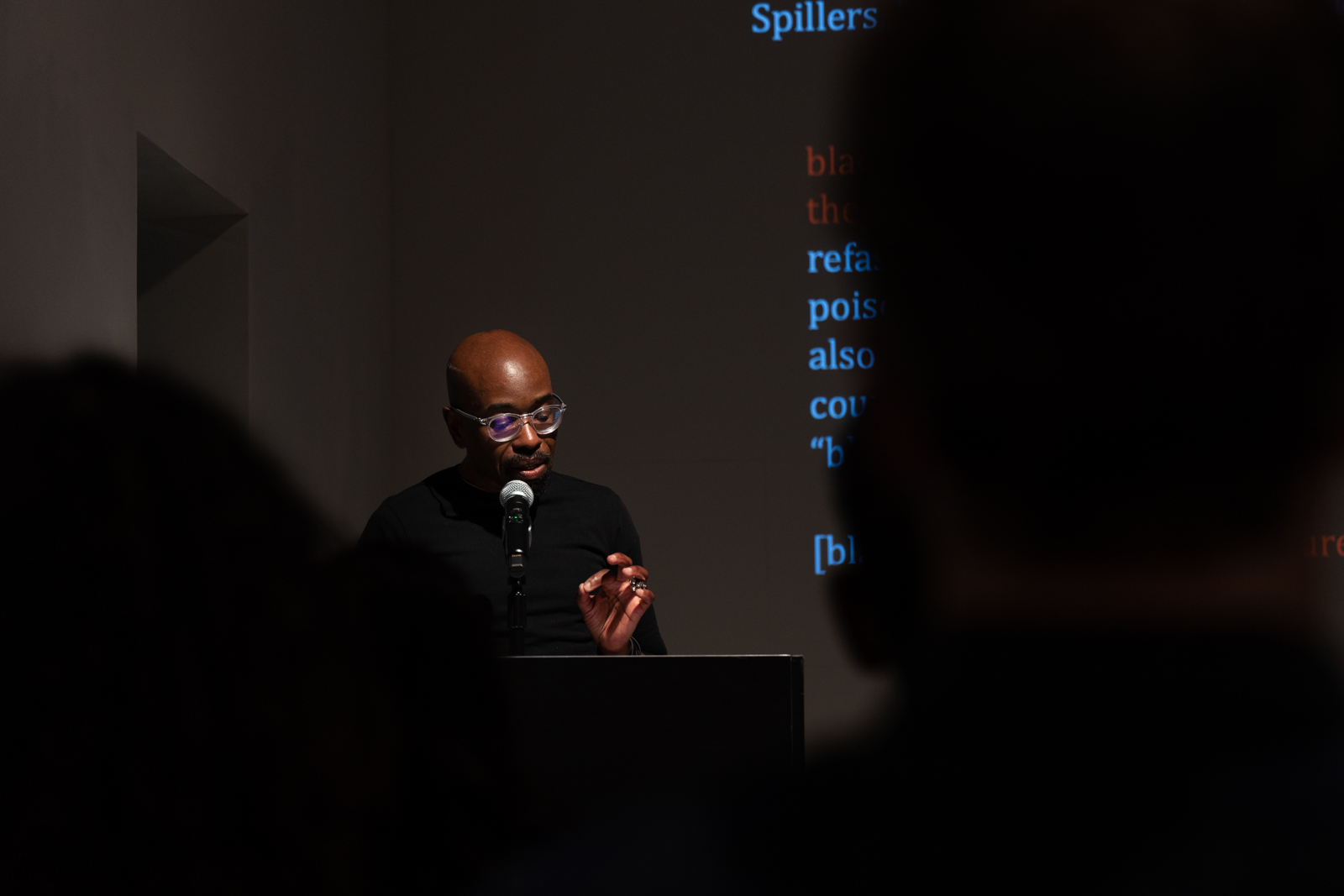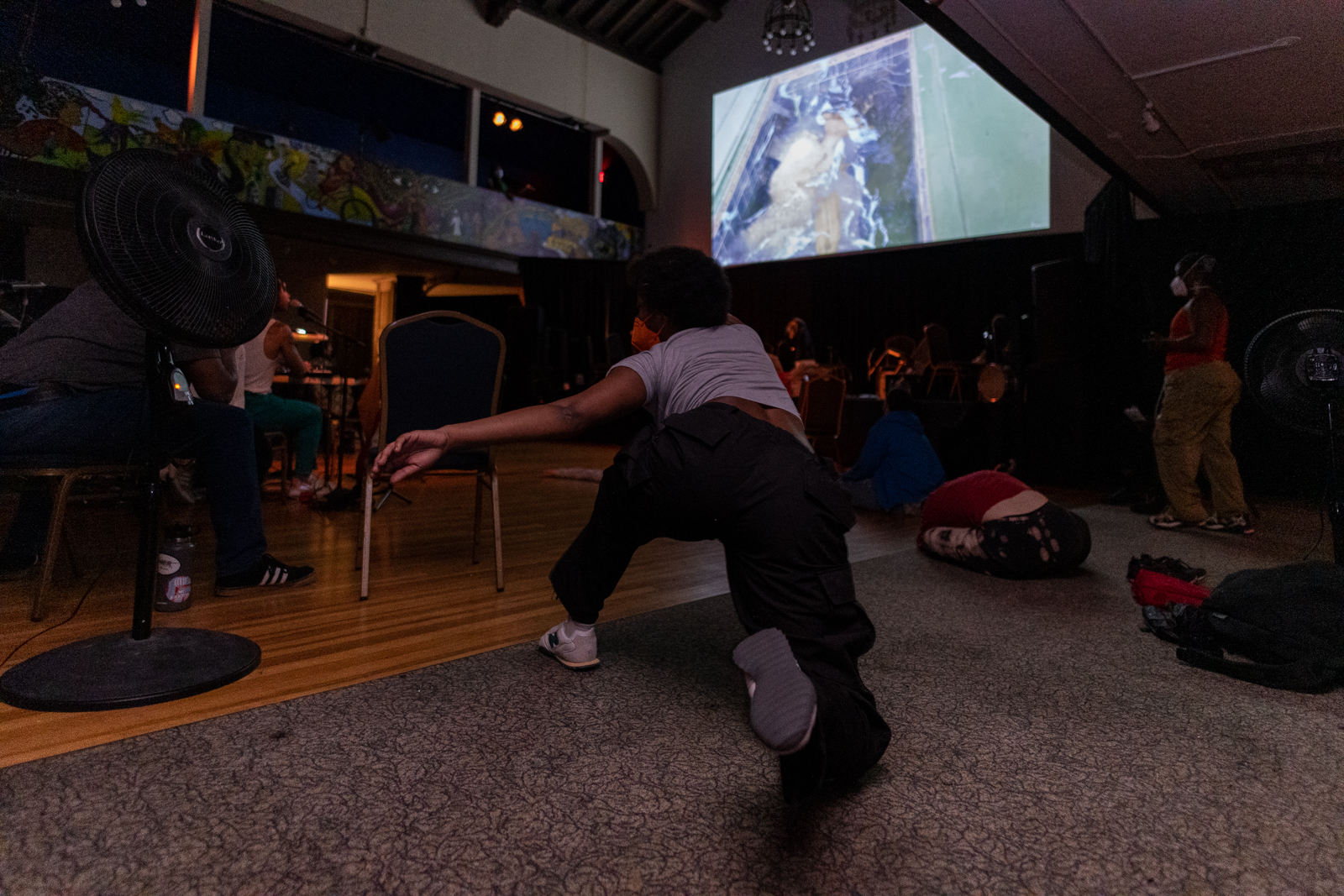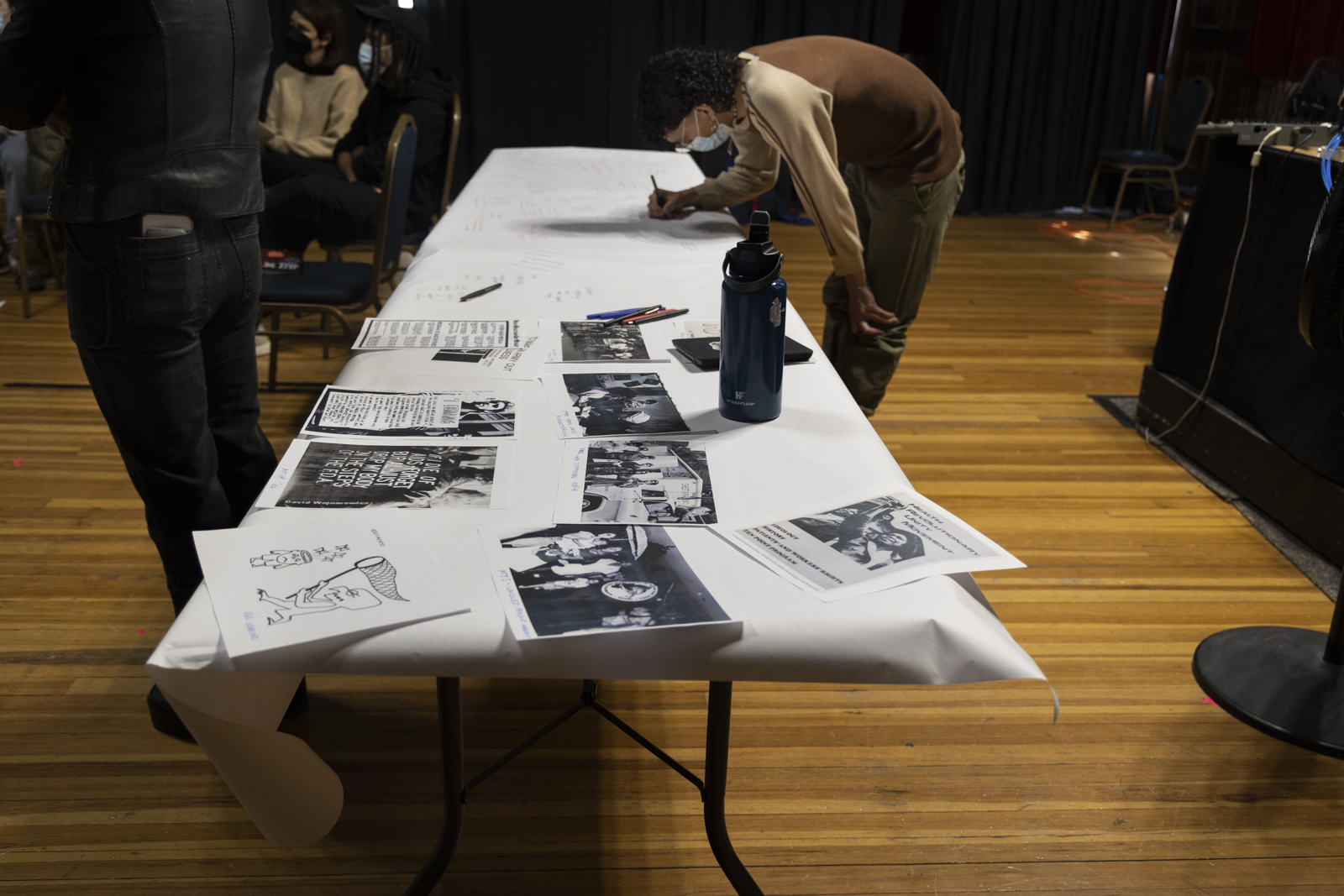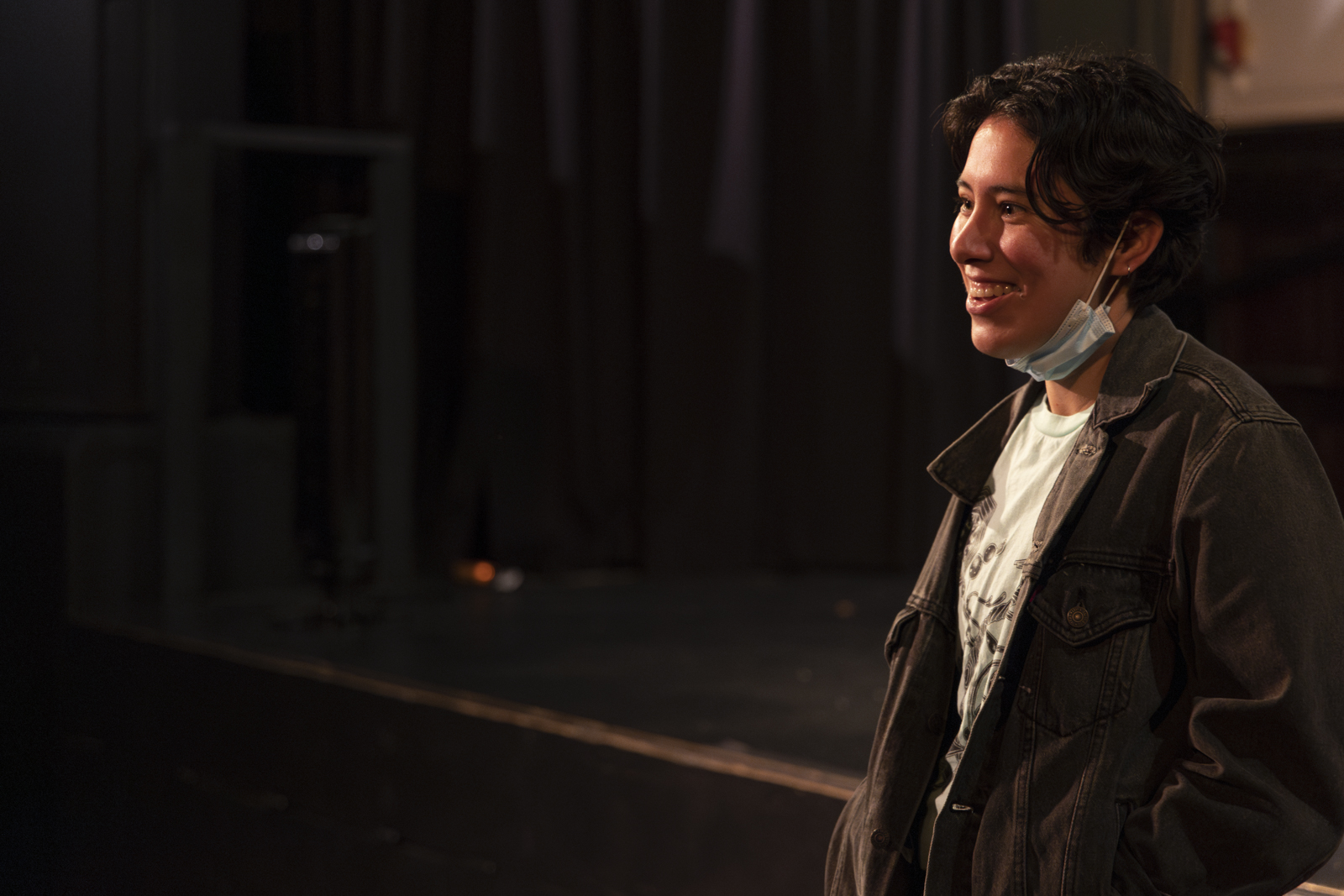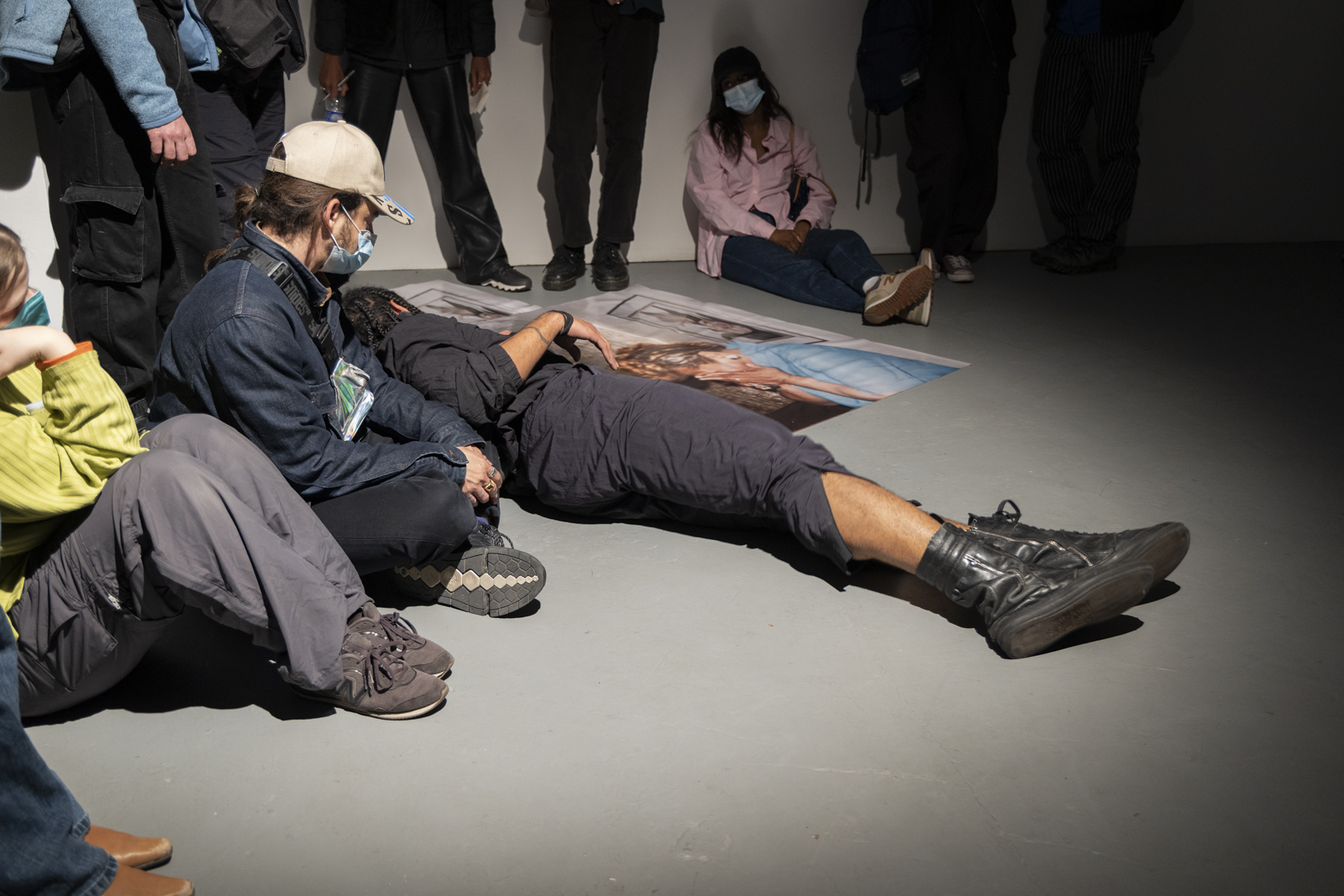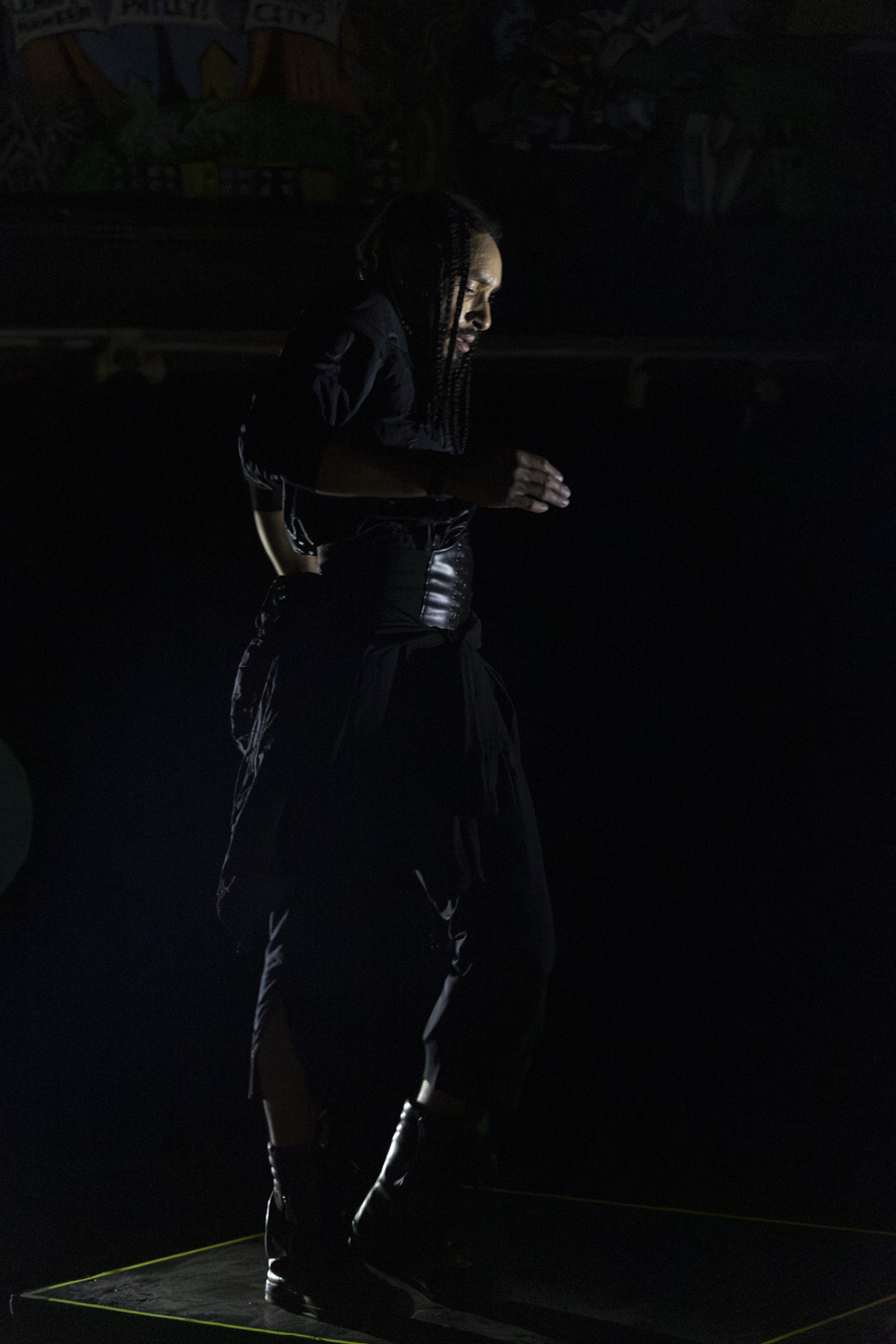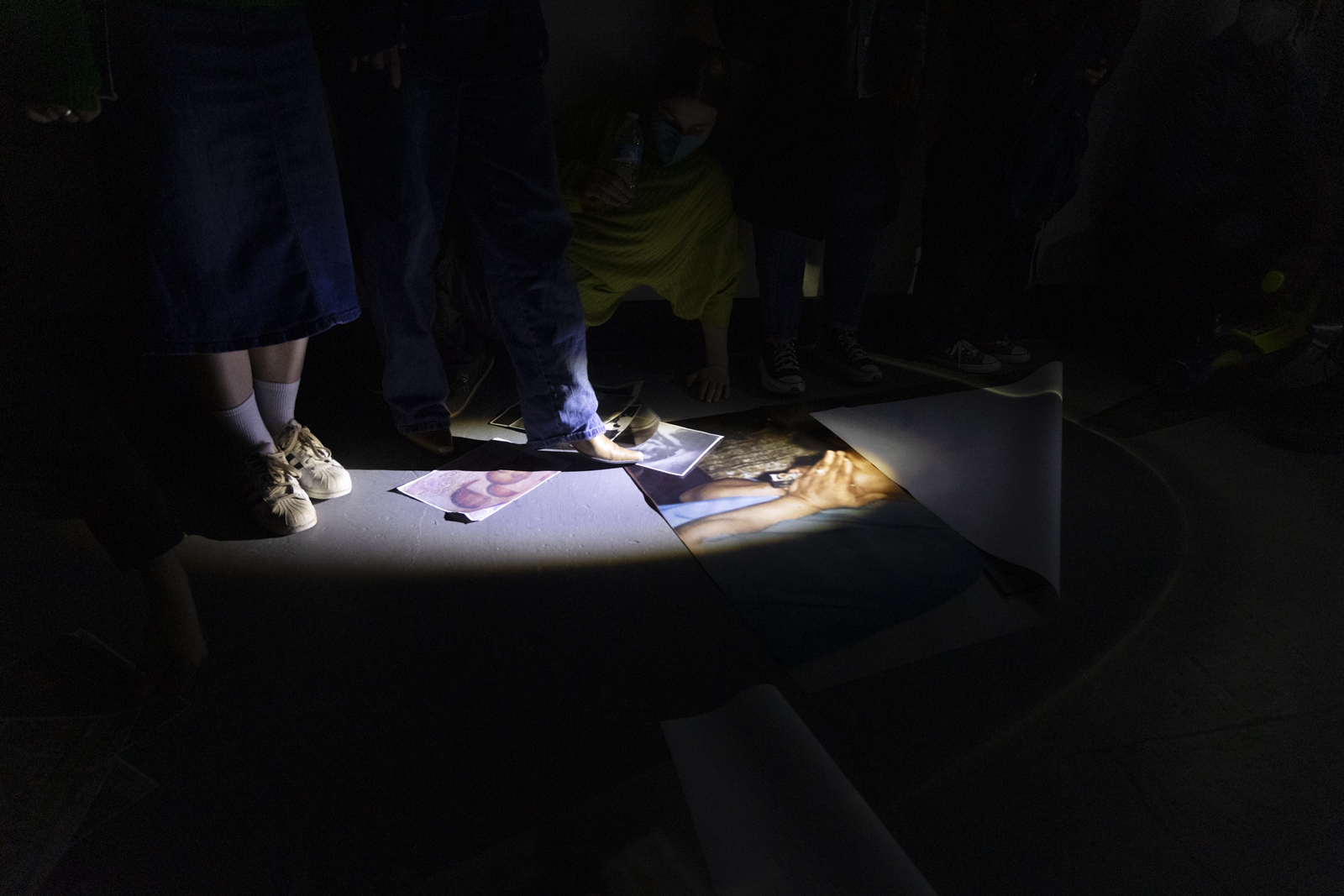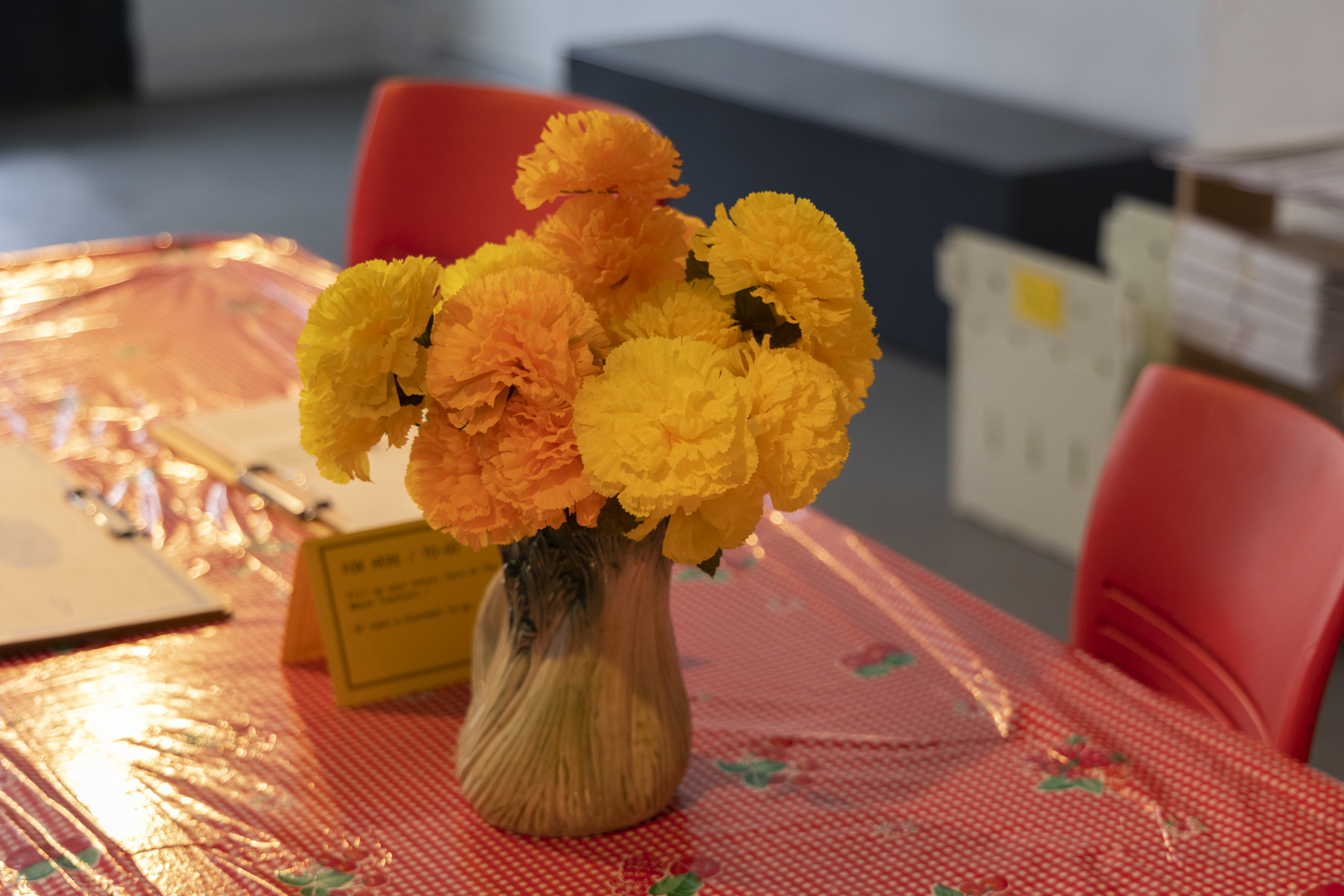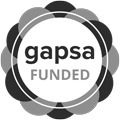-
Thursday, April 6
- 5:30 pm
-
What Might Live in a Word and a Sentence, Kevin Quashie (S)
What are the ways that surprise, estrangement, even consolation—even a small bit of that—live in sentences; and if such is the case, how does attending to sentences help us think about the work of black criticism in the world now?
This talk will be followed by a response and conversation with Margo Natalie Crawford, Professor of English at University of Pennsylvania. Crawford’s scholarship opens up new ways of understanding black radical imaginations. - 7:00 pm
-
djamn, Jonathan González and Marguerite Hemmings (R)
djamn is an improvisational study in motion, as word, with image, in repose, to witness, and resonate, for any and everyone to become a part. djamn is iterative. djamn emerges and decays and re-emerges, differently. djamn is an invitation. djamn is a sustaining note over an evening. djamn is a pause for breath. djamn is its dissonance. djamn is the dance in the corner. djamn is the soloist among the ensemble. djamn is the ensemble holding the soloist. djamn is a retreat inward and outward, again. djamn is after, during and before what is spoken. djamn wants you. djamn wants me. can I djamn with you? you can djamn with me. djamn. djamnin. djamn. damn! djamn.
djamn runs from 7–10pm. We invite you to attend for the full duration or to arrive at any point throughout the evening. - 10:00 pm
-
Pull Up, Simone White and Wilmer Wilson IV (R)
A lightning round of audio dialogue with Simone and Wilmer, interweaving their love of cars, Chief Keef and entropy.
This event will be held outdoors in front of the Rotunda.
-
Friday, April 7
- 11:00 am
-
Thinking with Poems, Kevin Quashie (S)
An open session to read and think with poems together, even to think as poems (invite us to) think.
- 4:00 pm
-
Critical Infrastructures, Adelita Husni Bey (R)
This workshop is an invitation to explore, through embodied pedagogy and performance, how critical infrastructure was deployed during the pandemic to justify the exploitation and endangerment of workers in reproductive sectors of the economy. Beginning by reading the March 2020 US government memorandum on critical infrastructure, the workshop asks participants to imagine and study critical infrastructure beyond how it has been used historically and during the pandemic—namely as a network of operations that sustains capital’s basic functions and way of life. What alternative readings and imaginaries of critical infrastructures are possible and what is the necessary work needed to actualize them?
Through performance exercises, discussions, and screenings, participants will learn about current and historical struggles in the redefinition of what counts as necessary work and re-imagine critical infrastructures from this perspective. The workshop will offer an analysis of the pandemic’s founding geographical and ideological myths. Working with three keywords—infrastructure, necessity and sacrifice—we will begin to undo and unlearn the contradictions the pandemic response has normalized.
This workshop runs from 4–7pm. It continues on Saturday April 8 from 1–4pm. We ask that workshop participants be able to attend both sessions. No previous knowledge or experience is required. Participation is limited. - 7:30 pm
-
Making Life in the Wastelands, Lou Cornum (R)
The 1994 film Fresh Kill, directed by Shu Lea Chang, is a high dyke drama for the post-atomic world. Set across the boroughs of New York City, from Staten Island trash heaps to trendy downtown sushi counters, it follows contaminated circuits of nuclear globalization in a manner both completely of the 90s and distinctly prescient. By returning to the film thirty years later in a collective viewing (laughter, groans, and other emotive commentary welcome), we can put into conversation the recent past and coming futures. The screening will be prefaced with remarks by Lou Cornum who will also facilitate an after-film discussion.
- 10:00 pm
-
Hahaha, 2023, Niall Jones (S)
[A performance for Slought, Rotunda and the road between]
...the ride with you was worth the fall my friend...
—Whitney H.
…an utterance that…marks and is marked by the art of passage without coordinates or arrival, the art of life in departure.
—Rizvana Bradley and Denise Ferreira da Silva
It looks like the show is over, or hasn't happened yet. He wanders around, as if to finish setting up or taking apart.
Obsessed With Structural Collapses And Ontological Breaches, "you ready?
Niall Messes In The Blurring And Merging Of Sites
Collapse
Scale
Enclosure
He might be talking to himself. Acts as if he were alone, moving equipment, listening to his music. But he also calls out light and sound cues to suit his shifting moods. Occasionally, he dances. He keeps fiddling with the controls. He drags, it sounds heavy. He's absorbed. He slips, he says, "Sorry." He bumps
Archive
Matter
No/Thing
He smiles, as a dancer might.
The performance, apparently, is performance-less.
OR
Ghosts
Always, (G)Host$
The teetering nature of genre: how things reach limits and tip (tip) (tip) into something
else.
Follow Him
Somewhere
else.
For conditions that produce and excrete dancing, remembering, feeling.
-
Saturday, April 8
- 1:00 pm
-
Critical Infrastructures, Adelita Husni Bey (R)
This workshop is an invitation to explore, through embodied pedagogy and performance, how critical infrastructure was deployed during the pandemic to justify the exploitation and endangerment of workers in reproductive sectors of the economy. Beginning by reading the March 2020 US government memorandum on critical infrastructure, the workshop asks participants to imagine and study critical infrastructure beyond how it has been used historically and during the pandemic—namely as a network of operations that sustains capital’s basic functions and way of life. What alternative readings and imaginaries of critical infrastructures are possible and what is the necessary work needed to actualize them?
Through performance exercises, discussions, and screenings, participants will learn about current and historical struggles in the redefinition of what counts as necessary work and re-imagine critical infrastructures from this perspective. The workshop will offer an analysis of the pandemic’s founding geographical and ideological myths. Working with three keywords—infrastructure, necessity and sacrifice—we will begin to undo and unlearn the contradictions the pandemic response has normalized.
This workshop runs from 1–4pm. It begins on Friday April 7 from 4–7pm. We ask that workshop participants be able to attend both sessions. No previous knowledge or experience is required. Participation is limited. - 4:00 pm
-
ON TOUCH, Julie Tolentino (S)
A four-hour group durational performance experiment with Maxime Cavajani, Ghida Dalloul, Mae Eskenazi, Julie Fowells, Rudy Gerson, shawné Michaelain Holloway, Abdul-Aliy A Muhammad, Vy Trinh, and lexi welch.
Etched into eight, thirty minute audience intervals, this working experiment engages the complexity of proximity and critical touch by exploring themes like haptic embodiment, pressured engagement and coalition eros, seeking forms of engaged agency, refusal, and renewal. The masked group enmeshes its built, broken, and blurred interiority with the emergence of collective propositions and intramural language(s).
Innervated by local artists and a live synthesized violinist, ON TOUCH feels through the politics of touch, pressure, and support as it vibrates through movement work, disability justice, kink, erotics, and withdrawal towards sustained intimacy. In this shifting environment, members hold (and evoke) space for past and future others—unfolding into a necessarily incomplete group dynamic, group engagement.
ON TOUCH runs from 4–8pm at thirty-minute intervals. - 5:00 pm
-
On Necessary Work + I Am Somebody, Adelita Husni Bey (R)
This double feature screens Adelita Husni Bey’s On Necessary Work (2021) alongside Madeline Anderson’s I Am Somebody (1970). Together, these two films offer an occasion to think with forms of collective organizing in the context of failing healthcare infrastructures. The screening is followed by a conversation and Q&A with Husni Bey.
I Am Somebody (1970), Madeline Anderson (30 minutes)
In 1969, 400 poorly paid black women—hospital workers in Charleston, South Carolina—went on strike to demand union recognition and a wage increase, only to find themselves in a confrontation with the National Guard and the state government. Supported by such notables as Andrew Young, Charles Abernathy, and Coretta Scott King, the women nonetheless conducted a strike under the guidance of District 1199, the New York based union, and the Southern Christian Leadership Conference. A testament to the courage of these women who would not be humbled, the now classic I Am Somebody is both an inspiring film and an important historical record.
On Necessary Work (2021), Adelita Husni Bey (30 minutes)
From April to May 2021, a small cohort of unionized nurses from the United States and Denmark were invited to partake in an online workshop to discuss the social construct of necessary work. The group read and studied the language used in protocols that insist on the necessity of work during the pandemic by assigning critical status to certain infrastructural and industrial sectors, brutally safeguarding capitalist production in crisis. Shifting risk, coded as responsibility to the workers, the guidelines issued by the US government on the 19th of March 2020, state that: “in a critical infrastructure industry…such as healthcare services and pharmaceutical and food supply,” workers have “a special responsibility to maintain a normal work schedule.” During the workshop, the nurses were asked to reflect on the ways in which their respective healthcare systems and unions responded to the crisis and record their own mobile phone footage following a set of exercises. The resulting footage, shot by the nurses and recorded during the online workshop on Zoom, was edited into On Necessary Work. - 8:00 pm
-
< p a r t y > (S)
Join us to celebrate the closing of Vol. 3 with drinks, dancing, hanging out, and a DJ set by Geo Wyex.
-
ONGOING
Come early and stay late to linger in these installations.
-
The Water Fountain, Organized by FORTUNE (S)
FORTUNE welcomes you to the Water Fountain, a space for pooling reflection. Here you can process information known, received, and incoming. Here you can transition between Walnut Street, the grid beyond, the two sites of Temporary Liveness, and the held spaces in each room.
In between, read through a collective bibliography from the School’s participants, at your pace. Leave your annotations for the next reader, or save your work for continued study. Exchange reference files and (re)marks with your co-learners. Pass notes and share time at the table. Take the instruction you need, take this moment, take a break. Here, fill your cup. -
Physical Education, Organized by Andrew J. Smyth (S)
The cinema program at School for Temporary Liveness invites you to linger with a sequence of excerpted films and related texts that revolve around the notion of social choreography. Situating dancing and danced behavior within capitalist social form, Physical Education offers a kinetic outlook on order and disorder, structure and process, work and play. How does the moving image transmit the gestural, haptic, and rhythmic qualities of political and economic regimes? How do collective regulations of motion and rest configure time and space? From the intramural ceremonies of the playground and the nightclub to the regimentations of the workplace and the colonial rituals of state power, the putting of oneself and others into motion comes into view as a technology of metamorphosis and capture. Selections will include works by Francis Alÿs, Charles Burnett, Ana Mendieta, and Trinh T. Minh-ha.
-
📍 (S) = Slought, (R) = Rotunda


